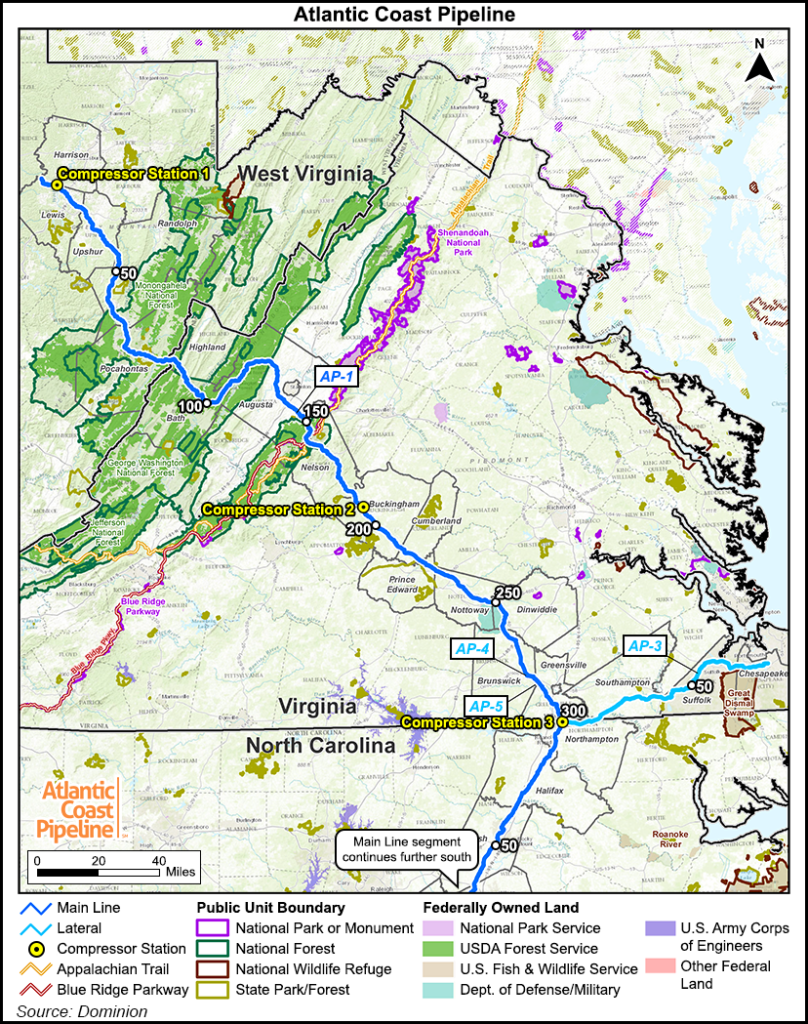Regulatory | Infrastructure | NGI All News Access | NGI The Weekly Gas Market Report
North Carolina Democrats Ask FERC to Pull Atlantic Coast Certificate
A group of North Carolina lawmakers has called on FERC to suspend its certificate for the Atlantic Coast Pipeline LLC (ACP), a sign of potential political hostility to a project partially backed by regulated utilities that operate in the state.

In a letter filed with the Federal Energy Regulatory Commission this week, 22 Democratic legislators from North Carolina’s Senate and House questioned the market need for the embattled 1.5 Bcf/d, 600-mile pipeline. They called on the Commission to suspend the project certificate, issued in a split decision in late 2017, “while it re-assesses the need” for ACP.
ACP is a joint venture of Dominion Energy, Duke Energy Corp., Piedmont Natural Gas and Southern Company Gas. The greenfield pipeline, a target of vocal opposition from various landowners, politicians and environmental groups more or less since its inception, is designed to transport Marcellus and Utica shale supplies from West Virginia into Virginia and North Carolina.
Duke, which acquired Piedmont in 2016, is headquartered in Charlotte, NC. Dominion, headquartered in Richmond, VA, serves both gas and electric customers in North Carolina.
“The pipeline developers have never convincingly demonstrated a public need for the ACP,” the lawmakers told FERC in their recent letter. “Falling renewable energy prices, and a growing body of evidence that the developers have overstated the demand for gas at the same time that upgrades to existing infrastructure have increased available capacity, further indicate the lack of market need for the ACP.
“If built, it would lock not just North Carolina but the entire Southeast region into decades of climate-disrupting fossil fuel use, which is incompatible with North Carolina’s climate goals as outlined” in Gov. Roy Cooper’s Executive Order 80.
The lawmakers alluded to a December order from Virginia’s State Corporation Commission that rejected Dominion’s integrated resource plan partly on grounds that the company’s forecast for electric load growth was too high.
“Further, the project has no independent committed customers,” the lawmakers wrote, echoing similar arguments raised by FERC Commissioner Richard Glick questioning the reliance on pipeline commitments between affiliated entities in determining project need. “Utility subsidiaries of Duke and Dominion in Virginia and North Carolina have contracted for 86% of the pipeline’s capacity. Heightened scrutiny must be applied to these affiliate transactions.”
For its part, ACP’s backers have maintained that the project is vital to the region’s energy security. Dominion spokesman Karl Neddenien told NGI that the project also has bipartisan support in the North Carolina General Assembly.
“The current pipelines serving Virginia and eastern North Carolina are stretched too thin and are not keeping up with demand,” Neddenien said. “Public utilities need new infrastructure to generate cleaner electricity, heat the homes of a growing population and attract new jobs and industries.
“The project is supported overwhelmingly by communities and leaders across eastern North Carolina. The bipartisan leadership of the North Carolina General Assembly has been vocally supportive, as have the local governments of nearly every city and county along its path. Most North Carolinians understand the importance of affordable and reliable energy to the region’s economy, and they support this project as a way to help the region transition from coal to cleaner energy.”
The letter from the North Carolina lawmakers highlights a strain of antagonism for natural gas projects in a political moment where climate change concerns have given rise to concepts like a Green New Deal, not to mention a slew of state proposals to curb reliance on fossil fuels.
The letter also comes as ACP has found itself in legal battles stemming from unfavorable rulings handed down by the U.S. Court of Appeals for the Fourth Circuit. In February, the Fourth Circuit declined to rehear a December ruling that found the U.S. Forest Service (USFS) authorizations for ACP to cross the George Washington and Monongahela national forests violated federal law. The court also tossed ACP’s permit to cross the Appalachian National Scenic Trail.
Dominion has argued that the Appalachian Trail decision in particular is “at odds with the consensus of the U.S. Department of the Interior, U.S. Department of Agriculture, National Park Service” and the USFS.
Meanwhile, a Fourth Circuit decision on ACP approvals from the U.S. Fish and Wildlife Service forced the pipeline’s developers to stop work on the project in December.
© 2024 Natural Gas Intelligence. All rights reserved.
ISSN © 1532-1231 | ISSN © 2577-9877 | ISSN © 1532-1266 |
